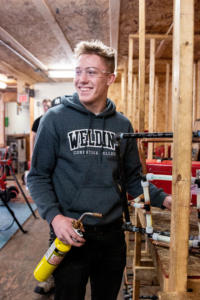Class Descriptions
Reuters Campus
Plumbing: This course will introduce students to the basic tools, materials, equipment, methods and current regulations as they relate to the residential plumbing field. Students will demonstrate the basic ability to identify, select and install common plumbing piping materials and fixtures. This course will introduce students to the Ontario Building Code relating to Plumbing. Students will use the current regulations to install typical residential fixtures and associated piping and venting.
Welding: This course will introduce the student to the basic concepts of Oxy-Fuel Welding (OFW), Brazing (OFB) and Cutting (OFC), Shielded Metal Arc Welding (SMAW). Theory class will cover the safe setup and working practices of these processes as well as introduce the student to the fundamental concepts involved in each process operation. The shop component will see the student implement safe working practices along with skills development in the area of OFW, OFB, OFC, SMAW. Students will practice the butt, lap and t-joint on mild steel using the above welding processes.
HRAC: An Introduction to the basics of the various skill sets used in HRAC including Sheet Metal work and ventilation, AC fundamentals and Cooling , Gas fitting and heating. Students will take part in both theoretical and practical studies, to provide them with the basic knowledge of the skills, safety procedures and theories they will require to participate in shop work. In each portion of the course, students learn to install and connect appropriate systems (air handling, heating and cooling). They will also be introduced to design drawings, manufacturer’s literature and installation programs for a variety of systems.
Electrical: This course is designed to introduce the students to the basics of residential electrical installations. Students will take part in both theoretical and practical studies to provide them with the basic knowledge of the skills, and safety procedures required for proper electrical installations. The residential, commercial, and industrial sectors will be discussed along with approaches needed to complete small scale electrical projects. The focus of the course will expose the students to the importance of quality, workmanship, and career opportunities within the electrical field.
CNC Programming: Students will be exposed to general machine shop practices, including clamping, cutting tools, speeds and feeds and as well as blueprint reading. The students use CNC simulator software to write a basic lathe and mill programs. The students will be exposed to industrial CNC equipment, set-ups and operation.
Machining: An introduction to the basic processes, procedures and applications involved in the operation of conventional machine tools used in a manufacturing environment. Exploration of topics such as saws, drilling machines, lathes, milling machines and surface grinders. Bench working tools, accessories and fasteners and routine housekeeping required to meet the government safety regulations, manufacturer’s recommendations and approved industry standards.
Waterloo Campus
Carpentry (Interior): Students will be introduced to the field of carpentry by studying the history, origins and background of the carpentry trade. Common hand and power tools used in carpentry in the residential, industrial, commercial and institutional (ICI) sectors will be discussed along with approaches needed to complete small scaled carpentry projects. Topics will also include quality, craftsmanship, career opportunities in carpentry, skills and knowledge needed to be a successful carpenter and the industry expectations for entry into the field.
Carpentry (Exterior): Students will apply the content studied in theory in a shop environment by completing hands-on projects specific to exterior finishes. Students will be instructed on the proper use of both hand and power carpentry finishing tools, and will practice safe use of the common tools encountered on a construction site. Students will also practice proper installation methods in order to meet industry standards.
Masonry: This option will be delivered in a 6 week block (May). Students will learn how to prepare masonry units for placement according to accepted trade practice. They will learn how to place mortar as they prepare to set units in place. This course is designed to build on a student’s existing trowel experience and to prepare them for the shop portion of the level One Brick and Stone program. Must be a registered OYAP apprentice.
Doon Campus
Cabinetmaking: The student will explore basic cabinet design and construction procedures in accordance with government safety regulations and industry standards. Students will learn to work safely within government standards and equipment manufacturer’s recommendations.
Notes
- Tools and equipment are provided
- Students are provided with their first pair of safety glasses
- Students will need CSA Green Triangle patch safety footwear
- Classes are primarily shop time (hands-on) with some accompanying theory